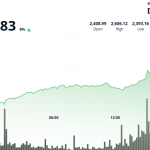Tokenized Stocks Go Mainstream: Kraken Launches xStocks
A significant development in the evolving tokenization landscape is underway. Crypto exchange Kraken and finance protocol Backed Labs have jointly launched xStocks, introducing tokenized versions of traditional stocks that can be traded 24/7.
What Are xStocks?
xStocks are technically called tokenized securities, representing fractional ownership based on widely-traded stocks. They offer features like 24/7 trading, instant settlement, and potential integration with decentralized finance (DeFi). Additionally, dividends are expected to flow directly into user wallets.
Enabling the Launch
While private keys allow buying xStocks on the Solana blockchain, actual creation (minting) and redemption of these tokenized assets require qualified, KYC’d investors via Kraken. Underpinning this structure is a Special Purpose Vehicle (SPV) registered in Liechtenstein, responsible for buying and selling the underlying stock on a regulated exchange during conventional market hours.
The Benefits and the Challenges
The headline-grabbing aspect of xStocks is perpetual, 24/7 accessibility, a stark contrast to traditional stock exchanges. To maintain value alignment, a primary market arbitrage mechanism works to keep the token price close to the cash market price during US market hours.
However, this comes with caveats. The most significant technical challenge is handling price convergence outside market hours.
As Dragonfly Capital’s Rob Hadick tweeted, market makers face a quandary over “providing liquidity on AMMs, let alone on weekends,” without being able to hedge fills before Monday’s market open, potentially resorting to wide spreads and limited volume to manage risk.
While potentially acceptable for smaller transactions, this liquidity deficit likely presents a major hurdle for large institutional flows seeking delta exposure.
The Comparison: Tokenized vs. Synthetic
Current tokenization focuses on replicating equity exposure in a DeFi context. However, the alternative offered by synthetic assets, particularly perpetual contracts, holds potential.
Kyber’s Ostium platform, for instance, provides leveraged stock exposure via synthetic perpetuals on Arbitrum.
| xStocks | Ostium Synthetics | |
|---|---|---|
| Trading Hours | 24/7 | 24/7 |
| Liquidity | Low (convergence issue) | Higher potential |
| Exposure Cost | Direct token price | Platform fees + interest |
| Initial Trading Cost ($250k TSLA) | High (peg maintenance) | ~100x lower |
| Captures Dividends | Potentially yes | No |
| Legal Claim | Yes, via SPV | Potentially no* |
| * Ostium provides synthetic exposure, not direct ownership. | ||
According to Ostium co-founder Kaledora Linn, the trading costs associated with establishing a $250k TSLA position via Ostium are significantly lower than what would be encountered using current tokenized stock mechanisms.
Setbacks and the Road Ahead
A closer look at Robinhood’s implementation details (thanks to industry analyst Ren of Electric Capital) indicates that KYC and AML filters likely restrict transfers to pre-approved addresses, aligning more with regulated custodial solutions than a truly DeFi-native model at this stage.
While xStocks represent a notable industry milestone – offering greater trading flexibility and potentially familiarizing newcomers to crypto’s capabilities – the immediate market focus seems to be refining the practical functionality, particularly addressing the low weekend liquidity and associated high transaction costs.
In Conclusion
xStocks mark an important step towards bridging traditional finance (TradFi) and decentralized finance (DeFi) in the equity space. However, substantial challenges regarding price discovery outside-hours and efficient capital deployment remain.
While tokenized stocks offer unique advantages like 24/7 access, increased liquidity during off-hours appears necessary for sustainable institutional adoption. For sophisticated participants seeking exposure, lower-cost synthetic solutions on platforms like Ostium currently appear to offer a more compelling, less congested alternative outside core market hours, despite forfeiting direct ownership benefits.












